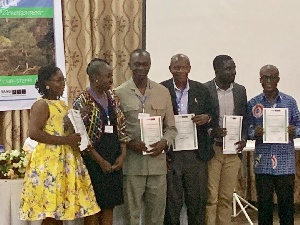A Ghanaian consortium that focuses on nature conservation have emerged winners of the first African Biodiversity Challenge (ABC) a regional initiative that seeks to collect primary data on biodiversity to enhance its information management.
The air, food and water humans live on is all supported by biodiversity, which is made up the different types of ecosystems, species of organisms with the variety of life on earth.
The ABC’s objective is to capacitate and incentivise African countries to mobilise as many national biodiversity data of strategic importance as possible and develop a cohesive national biodiversity information management network.
In total, the Ghana consortium gathered 23,932 foundation data on nature including pollinators; forestry, food crops and class of animals to snatch the win from group Malawi that also collected 9,641primary information on biodiversity to finish second.
The third spot was won conjointly by team Namibia and Rwanda who collected 6,400 data on mammals and data on 2,164 freshwater biodiversity plant and invertebrates.
Professor Kwabena Frimpong-Boateng, Minister of Environment, Science, Technology, and Innovation in a statement delivered on his behalf at an award ceremony in Accra commended all the contestants especially the Ghanaian consortium for winning the competition adding that information collected would help make critical development policy decisions.
The ABC which is being managed and implemented by Sanbi, in collaboration with Global Biodiversity Information Facility and other project partners, seek to mobilise data on thematic areas relevant for country reporting and economic processes and thus incorporate the value chain of primary data to information management and decision-making.
The Ghana Consortium is made up Conservation Alliance International, A Rocha Ghana, Ghana Biodiversity Information Facility of the University of Ghana and Council for Scientific and Industrial Research (CSIR)
Biodiversity information, Prof. Frimpong Boateng explained was crucial to furthering the country’s sustainable development agenda including energy, tourism, agriculture, health and green economy.
Prof. Frimpong-Boateng stated that biodiversity information had both national and international relevance with respect to Ghana’s commitments to Convention on Biodiversity, the Intergovernmental Science-Policy Platform on Biodiversity and Ecosystem Services and the Sustainable Development Goals.
“Research shows that between 2004 and 2015, investment in conservation businesses and green economic development amounted to US$ 8.2 billion in private capital,” he said.
“A total of $6.5 billion in private capital was also allocated to projects implementing sustainable food and fiber: $1.3 billion for habitat conservation and $400 million to improving water quality and delivery”.
However, the Minister said only 9 per cent of the huge investment came to Africa, with the bulk 62 per cent being invested in North and Latin America.
He attributed the cause to the lack of primary data to be used to quantify baseline biodiversity patterns or evaluate local ecosystem services and the absence of a biodiversity information monitoring system to effectively measure the impact of the investment largely account for the low investment in African countries.
“Investors want consistent, standardized and accurate evaluations of natural capital and biodiversity to confidently support any green enterprises for sustainable development,” he said.
Prof. Frimpong-Boateng said the ministry was preparing the accompanying implementation Plan of the National Biodiversity Strategy and Action Plan developed in 2017.
Professor Victor Agyeman, Director General of the Council for Scientific and Industrial Research (CSIR) said the Ministry was assisting the CSIR to establish a high-speed data platform to host data on a range of disciples to enhance research and development in the country.
Mobilising biodiversity data is the foundation of mainstreaming conservation into governmental policy. However, critical data-deficits currently undermine efforts to conserve and sustainably use biodiversity in Africa. Currently, less than 4 per cent of the total records published on the Global Biodiversity Information Facility pertain to Africa.
General News of Monday, 1 April 2019
Source: ghananewsagency.org

















